News (All)
News Legal Blog Upcoming Events
News
In the News
CMM Secures Win in U.S. District Court (SDNY)
February 3rd, 2026

In the News
Campolo Recognized as a Long Island Business Influencer
February 2nd, 2026

In the News
SCBA Fireside Chat with the Honorable Joseph F. Bianco
January 30th, 2026
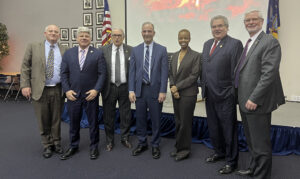
In the News
CMM Represents Long-Time Client in Acquisition of Energy Management Business
January 26th, 2026

In the News
Campolo Moderates HIA-LI 48th Annual Meeting & Legislative Program
January 19th, 2026
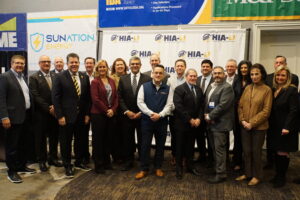
In the News
CMM Completes Successful Sale of Food Industry Business
January 19th, 2026

In the News
CMM Guides Client Through Business Acquisition Unwind
January 12th, 2026

In the News
CMM Navigates High-Stakes Business Divorce on the East End
January 6th, 2026

In the News
Middleton Advocates for Private Helicopter Charter in East Hampton Airport Dispute
December 12th, 2025
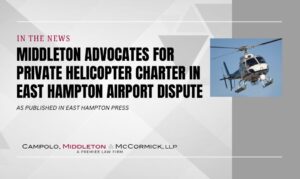
In the News
CMM Partner Vincent Costa Named Leadership in Law Award Honoree
November 14th, 2025
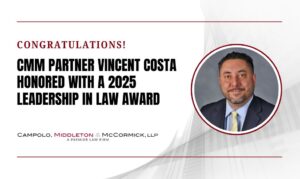
In the News
CMM Closes Commercial Real Estate Acquisition
November 6th, 2025
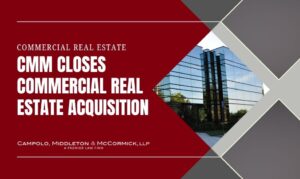
In the News
10 CMM Attorneys Named to the 2025 Super Lawyers® and Rising Stars List!
October 6th, 2025

In the News
Campolo Recognized as a Long Island Business Influencer in Law
September 12th, 2025
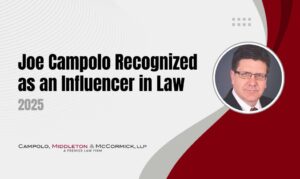
In the News
Christine Malafi Named to Dan’s Power Women of the East End
September 10th, 2025

In the News
Richard A. DeMaio Named CMM Partner
September 2nd, 2025

In the News
Legal History Insights: Summer Edition
August 25th, 2025
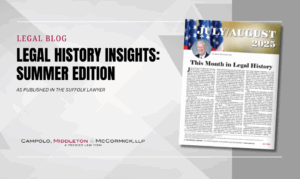
In the News
CMM’s Scott Middleton Featured in The Best Lawyers in America® for the 12th Year in a Row
August 21st, 2025

In the News
CMM’s Christine Malafi Featured in The Best Lawyers in America® for the 9th Consecutive Year
August 21st, 2025

In the News
Campolo Appointed Treasurer of the Board for the Guide Dog Foundation and America’s VetDogs
August 11th, 2025

Deals
CMM Closes Prime Commercial Real Estate Sale of NJ Shopping Center
July 25th, 2025

Legal Blog
blogs
Can a City or Town be Held Responsible for the Actions of its Snowplow Drivers?
February 25th, 2026

blogs
Why Investors are Bullish on Long Island’s Growing Economic Power
February 23rd, 2026

blogs
Winter Weather Policies for Employers
February 20th, 2026

blogs
A Word of Caution with Use of Olympic Marks
February 10th, 2026

blogs
NYS Department of Labor Announces New Electronic Certified Payroll Submission Requirements in 2026
January 29th, 2026

Landlord-Tenant
CMM Expands Landlord-Tenant, Real Estate Practices with Merger
January 22nd, 2026
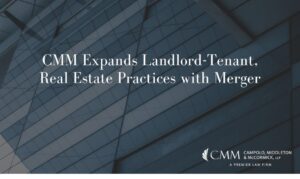
Legal Blog
Key Takeaways for Employers From New York’s Wage Theft Lawsuit Against UPS
January 14th, 2026

Legal Blog
Current Real Estate Market Conditions Offer Opportunities for Retail Tenants
January 5th, 2026

Landlord-Tenant
High Bar for Tenants: Court Sides with Landlord in Harassment Case

Legal Blog
2026 Changes to Minimum Wage and Overtime Exempt Salary Threshold
December 8th, 2025
Legal Blog
Why Real Estate Due Diligence is Critical in M&A Transactions
November 19th, 2025

Legal Blog
Protect Your Business from Wage Lawsuits: How Simple Recordkeeping Can Save Your Business
November 11th, 2025

Legal Blog
Rethinking Arbitration Clauses — What Business Owners Need to Know
October 31st, 2025
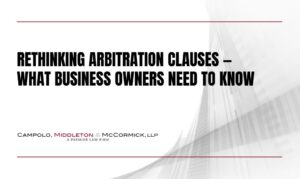
Legal Blog
Employment and Compensation Issues in M&A Transactions
October 24th, 2025

Legal Blog
NY Courts Issue Interim Policy on Judges’ Use of AI
October 17th, 2025
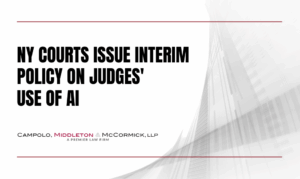
Legal Blog
The Overlooked Obstacle in M&A: Existing Debt and Its Hidden Risks
September 10th, 2025

Legal Blog
What Really Keeps M&A Deals on Track? A Closer Look at Governance and Fiduciary Duties
September 10th, 2025

Legal Blog
How Commercial Contracts Can Make or Break Your M&A Deal
September 2nd, 2025

Legal Blog
Consents and Approvals: The First Gate to Closing an M&A Transaction
August 6th, 2025
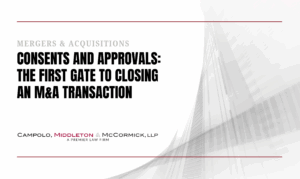
Legal Blog
Ethics and AI: What Lawyers Need to Know
June 26th, 2025

Upcoming Events
March 26, 2026
HIA-LI Economic Development Advancements: Towns Shaping Long Island’s Future (3/26/26)
May 2, 2026
Staller Center Gala Featuring Bernadette Peters
Explore Our Library
March 26, 2026
HIA-LI Economic Development Advancements: Towns Shaping Long Island’s Future (3/26/26)
May 2, 2026
Staller Center Gala Featuring Bernadette Peters
View our archives: News, Legal Blog, Negotiation Blog, Event Photos, Business Unusual, Long Island News Radio, CMM Live, Spotlights